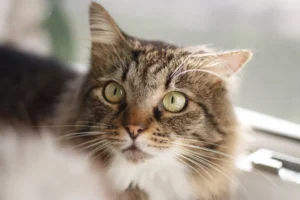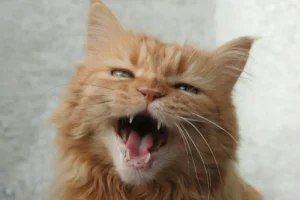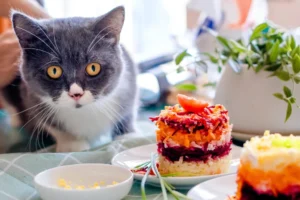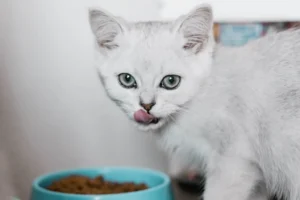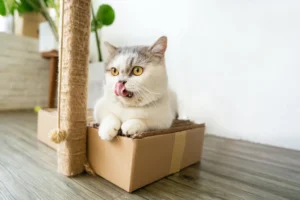Feral cats can be mysterious creatures, especially when they start meowing incessantly. As a cat owner, it can be puzzling to understand why a feral cat keeps meowing. In this blog post, we will explore the reasons behind this behavior and provide insights on how to address it.
The Impact of Hunger on a Feral Cat’s Meowing
When you hear a feral cat meowing persistently, hunger could be a major player in their vocalizations. Imagine being out in the wild, constantly on the lookout for your next meal. Feral cats face this reality every day, leading them to meow loudly as they search for food. Hunger drives these feline friends to communicate their needs through meowing, hoping to alert potential food sources or even human caregivers who might offer a helping hand.
In the world of feral cats, meowing isn’t just for communication – it’s a survival skill. These cats rely on their voices to attract attention and hopefully secure a meal. So, the next time you hear a feral cat meowing non-stop, consider offering some food to help satisfy their hunger and provide much-needed nourishment.
The Role of Territory and Communication in a Feral Cat’s Meowing
Territory is everything to a feral cat, and meowing serves as a key tool in establishing and maintaining their claim. Picture this: a feral cat boldly announcing its presence through loud meows, warning off potential intruders and marking its territory for all to hear. Territory matters greatly to these independent felines, and meowing is their way of asserting dominance and ownership over their domain.
Moreover, communication is vital among feral cats for various reasons. Meowing helps them connect with other cats, sending out signals about their presence, intentions, and emotional state. By meowing, feral cats not only defend their territory but also engage in social interactions with their peers. So, when a feral cat keeps meowing incessantly, it may be expressing a need to protect its turf or engage in friendly banter with fellow felines.
Remember, understanding why a feral cat keeps meowing goes beyond mere noise – it’s a form of expression deeply rooted in survival instincts and social dynamics. By acknowledging these underlying motivations, you can better empathize with our meowing friends and provide the care and support they need in their environment.
The Influence of Socialization on a Feral Cat’s Meowing
When it comes to feral cats, their meowing habits can be influenced by their level of socialization. Feral cats that have not been socialized with humans or other cats may use meowing as a way to seek attention or interact with other felines in their colony. Since feral cats rely heavily on vocalization to communicate with their fellow cats, increased meowing can be their way of connecting with others and establishing social bonds.
Furthermore, feral cats that lack proper socialization may meow more frequently because they are trying to express their needs or feelings in an environment where interactions are limited. By vocalizing, they might be attempting to communicate their hunger, loneliness, or even discomfort to others in their community.
In order to help reduce excessive meowing in feral cats due to socialization issues, it is important to provide them with opportunities for positive interactions with other cats and possibly even supervised socialization with humans. This can help fulfill their social needs and reduce their reliance on meowing as their primary form of communication.
Unique Insight: Providing feral cats with toys, scratching posts, and other enriching activities can also help reduce excessive meowing by keeping them mentally stimulated and engaged. These activities can serve as a healthy outlet for their energy and prevent boredom, which can often lead to increased vocalization.
The Impact of Medical Issues on a Feral Cat’s Meowing
When feral cats exhibit excessive meowing, it’s essential to consider the potential impact of underlying medical issues on their vocalization. Cats, whether feral or domestic, may meow more frequently if they are experiencing pain, discomfort, or health problems that need attention. In such cases, meowing can be a way for them to communicate their distress and seek help.
Some common medical issues that can contribute to increased meowing in feral cats include dental problems, urinary tract infections, or injuries from fights with other animals. If a feral cat is meowing excessively and there are concerns about their health, it is crucial to seek veterinary care promptly to address any underlying medical issues.
By addressing any medical problems promptly, you can help alleviate the feral cat’s discomfort and reduce their need to meow excessively. Regular veterinary check-ups and preventative care can also help identify and address potential health issues before they escalate and lead to increased vocalization.
For additional resources on feral cat health and care, you can refer to the American Society for the Prevention of Cruelty to Animals (ASPCA) website for valuable information on providing medical care for feral cats.
Strategies for Addressing Excessive Meowing in Feral Cats
Feral cats may keep meowing for various reasons, such as seeking attention, expressing hunger, or feeling scared. To address excessive meowing in feral cats effectively, consider providing essential resources like food, water, and shelter. By meeting their basic needs, you can help alleviate their distress and reduce their constant vocalization.
Another crucial step is seeking veterinary attention when necessary. Meowing can also be a sign of underlying health issues in feral cats. A visit to the vet can ensure they receive proper care and treatment, potentially resolving the excessive meowing behavior.
Remember, building trust with feral cats takes time and patience. Approach them calmly and avoid sudden movements to help them feel more at ease. By creating a safe environment and addressing their needs, you can help reduce excessive meowing in feral cats and improve their well-being.
The Benefits of TNR Programs for Feral Cats
Trap-Neuter-Return (TNR) programs play a vital role in managing feral cat populations and reducing instances of excessive meowing. These programs involve trapping feral cats, spaying or neutering them, and returning them to their original location. By preventing unwanted litters, TNR programs help control the feral cat population in a humane and effective way.
Additionally, TNR programs can reduce the instinctual drive to roam and mate, leading to decreased instances of excessive meowing in feral cats. By implementing TNR initiatives in your community, you can contribute to the well-being of feral cats and help address the issue of overpopulation responsibly.
Tip: If you’re interested in learning more about TNR programs and how you can get involved, check out this informative resource: Alley Cat Allies – Trap-Neuter-Return Guide.
The Importance of Patience and Understanding in Dealing with Feral Cats
When it comes to understanding why a feral cat keeps meowing, it’s crucial to approach the situation with patience and empathy. These cats may have unique needs and behaviors that require sensitive handling. Instead of getting frustrated by their constant meowing, try to put yourself in their paws and consider what they might be trying to communicate.
Key Insight: Sometimes, feral cats meow as a way to seek attention, food, or warmth. By responding with patience and understanding, you can build trust with the cat and create a more positive interaction.
By taking the time to observe and listen to the feral cat, you can better understand their needs and respond appropriately. Remember that building trust with a feral cat takes time, so approach the situation with empathy and understanding. With patience and a caring attitude, you can create a bond with the feral cat and address their meowing behavior more effectively.
Addressing Specific Needs of a Feral Cat
If you’re wondering why a feral cat keeps meowing, it’s essential to consider their specific needs. Feral cats may meow to communicate hunger, stress, or discomfort. Providing consistent food, water, and shelter can help address some of these needs and reduce excessive meowing.
Key Tip:
– Provide Regular Meals: Feral cats may meow out of hunger, so ensure they have access to regular meals to keep them satisfied.
– Comfortable Shelter: Offering a safe and comfortable shelter can help reduce a feral cat’s stress and provide a sense of security.
– Provide Fresh Water: Keeping a fresh water source available can help keep feral cats hydrated and prevent excessive meowing due to thirst.
By addressing the specific needs of a feral cat, you can help reduce their meowing behavior and create a more comfortable environment for them to thrive. Remember, each feral cat is unique, so observe their behavior and adjust your care accordingly to meet their individual needs.
Alex, a passionate animal lover, has experience in training and understanding animal behavior. As a proud pet parent to two dogs and three cats, he founded AnimalReport.net to share insights from animal experts and expand his knowledge of the animal kingdom.


